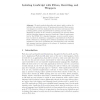303 search results - page 42 / 61 » A formal executable semantics of Verilog |
POPL
2010
ACM
14 years 6 months ago
2010
ACM
In functional programming, monadic characterizations of computational effects are normally understood denotationally: they describe how an effectful program can be systematically ...
ESORICS
2009
Springer
14 years 9 months ago
2009
Springer
Abstract. We study methods that allow web sites to safely combine JavaScript from untrusted sources. If implemented properly, filters can prevent dangerous code from loading into t...
KBSE
2000
IEEE
14 years 1 months ago
2000
IEEE
Little-JIL, a new language for programming the coordination of agents is an executable, high-level process programming language with a formal (yet graphical) syntax and rigorously...
ATAL
2007
Springer
14 years 29 days ago
2007
Springer
From a multiagent viewpoint, a workflow is a dynamic set of tasks performed by a set of agents to reach a shared goal. We show herein that commitments among agents can be used to ...
TLDI
2009
ACM
14 years 5 months ago
2009
ACM
Type-and-effect systems are a natural approach for statically reasoning about a program’s execution. They have been used to track a variety of computational effects, for example...

